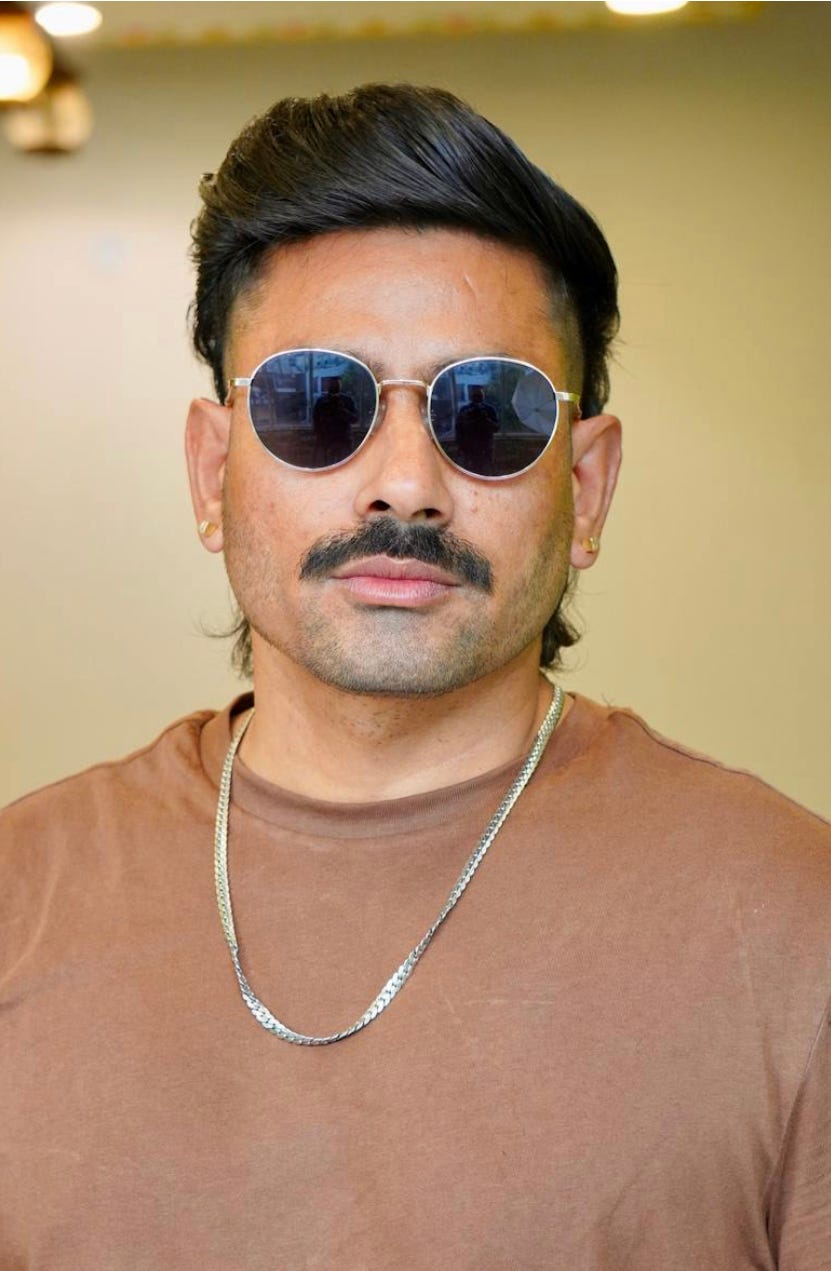2024: The year the mullet goes mainstream?
The mullet is the haircut of a man who has nothing to lose. Could this be its year?
In a leafy student suburb of Oxford, near where I live, there’s a barbershop that specialises in mullets.
When you walk in, you’re welcomed by a friendly man with a beanie and corduroy trousers rolled halfway up his shins. “Beer or espresso?” he’ll ask. “Umm… I have an appointment?” you’ll respond awkwardly. He’ll laugh, comment that it’s good that you booked ahead (they rarely have space for walk-ins), and explain that all customers get a complimentary drink while they have their hair cut.
Part of you wants to accept the drink - you paid £27 for this appointment (!) - but the sensible part of you doesn’t want a beer with flecks of hair in it at 11am. Then again, that part of you died the moment you decided you want a mullet. “Do you have an IPA?” you hear yourself say, as he ushers you over to the chair. So this is what it feels like to be a bad boy, eh?
2024 - the year the mullet goes mainstream?
When the historians of 2124 look back on 2024, they’ll have a staggering amount of content with which to fill their books. This coming year, there will be more national elections than in any recent year. We’ll also have an Olympics, an historic climate conference, and the fifth season of Love Island. But all of this will pale in comparison to an even greater political, economic and cultural moment: the ascendancy of the mullet.
Of course, those of you who are over the age of 10 will know that mullets have been around for years. They first gained notoriety on the heads of 70s rockstars, but in 2024 you’re equally as likely to find one on an Australian footballer or a Gen Z white boy from the Home Counties. At Leeds University, mullets now outnumber students at a ratio of 2:1, pushing the mullet into the same cultural echelon as the Arctic Monkeys and Monzo Bank’s social media team. If we don’t see at least one presidential candidate sporting a mullet this year, I’ll be highly surprised.
All of this helps explains why I - a married 27 year old tech bro from Oxford - now find myself in a baber’s chair making small talk about beanies, a subject I know nothing about (“I love the way you’ve rolled it up?”).
For me, getting a mullet is something I’ve wanted to do for a few months. You don’t tend to see many mullets in my corporate office, but that doesn’t deter me. I work in tech, where eccentricity can be easily misinterpreted as a sign of brilliance, and when I told my boss I was getting a mullet she didn’t immediately threaten to fire me. I took this as a good sign.
I wanted a mullet for two reasons. First, because they’re awesome. Second, because why the heck not. I’ve had the same haircut for 10 years (short back and sides), and I’m ready for a change. My last non-boring haircut was the Justin Bieber-style mop I had at age 15, and it was fantastic. I felt like I was wearing an iconic piece of history on my head. For some, this feeling only comes through joining political movements and chaining themselves to trees. For me, it came through looking like an idiot, and I can’t wait to recapture that feeling.
Am I having a quarter-life crisis? Possibly. I hand over my £27 and walk out the barbershop, trying to get the flecks of hair out of my teeth. Note to self: the IPA was a bad choice. I’ll have an espresso next time and down it before the haircut begins.
The post-modern mullet
In a stuffy Parisian library in the late 1970s, the French academic Jean-François Lyotard wrote a famous book called The Postmodern Condition in which he argued that the current age is characterised by “incredulity towards metanarratives”. Lyotard felt that society was becoming increasingly distrustful of metanarratives like Progressivisim and Enlightenment, and that many were craving more authentic, nuanced narratives which better aligned to their lived experiences.
(Ever the postmodernist, he later rejected this metanarrative as “simply the worst of all my books”).
Why am I banging on about French post-structuralists? Well, without being too pretentious, it’s because I like to think of the modern mullet as the latest iteration of this “incredulity towards metanarratives”. Growing up, we internalise many metanarratives about work and adulthood. We’re taught to be sensible careerists who get on the housing ladder and slot into the capitalist machine. There are lots of good things about these metanarratives, but I think there’s also something about them that doesn’t quite satisfy all our individual personalities and lived experiences. Maybe that’s what the mullet represents? Maybe there’s something in the “why not” attitude a mullet embodies that would be good for all of us. The mullet is the haircut of a man who’s got nothing to lose, and there’s something quite liberating about getting one. You should try it! And if you do, please promise me that you’ll run for President. The historians of 2124 will certainly thank you.


